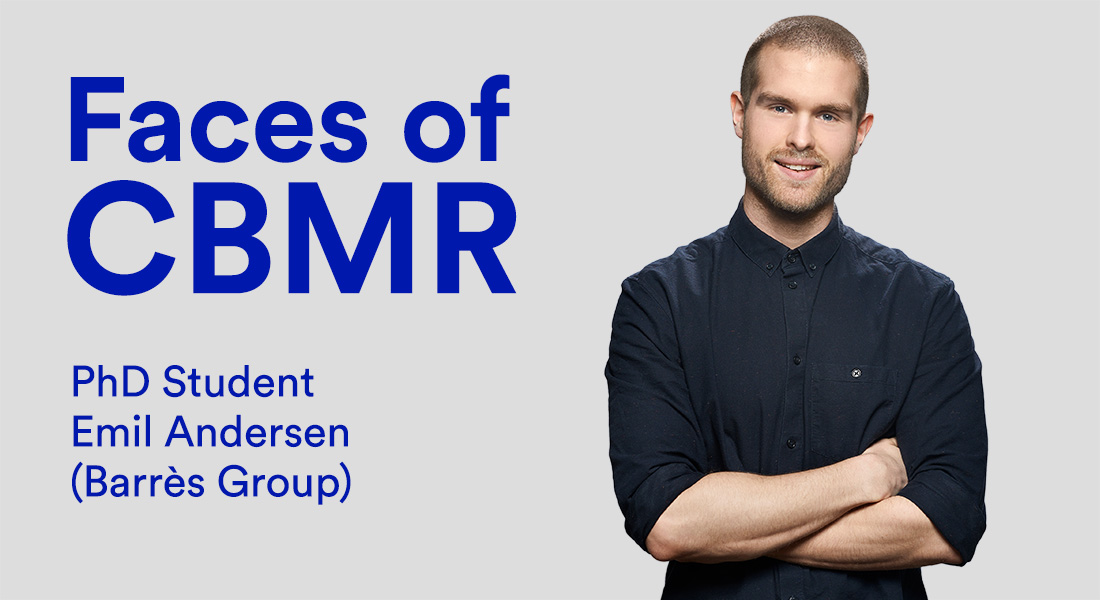"I loved working all the time – from basic research to entrepreneurial work"
Emil Andersen is a PhD candidate at CBMR. A member of the Barrès group, he researches metabolic epigenetics. Emil is also the co-founder and chief scientific officer of ExSeed Health, which sells kits that allow men to test the quality of their sperm at home.

Where did your interest in science come from?
When I was younger I was obese. Around the age of 14, I began trying to lose weight and got interested in food science, nutrition, and the science of exercise. I started reading forum discussions and scientific articles and that's what grabbed my attention and got me interested science in general. Of course, it wasn’t nitty-gritty science, more “how does exercise affect health” and “what exercise routines are best for losing weight” — but those are the building blocks of understanding metabolism as well.
What was your academic path to CBMR?
After high school, I volunteered to work with disabled children and found many of the diseases they had — like muscular dystrophy and cerebral palsy — interesting. I considered studying medicine but because of my interest in exercise and nutrition, I chose to study sports science. As part of my bachelor’s degree, I helped research whether electrodes can be used to help treat cerebral palsy. Then I got a master’s degree in human biology, which involved more molecular biology of course. My master’s thesis was on preadipocytes, which involved taking biopsies from obese and lean men and isolating stem cells. Our hypothesis was that preadipocytes carry the “memory" of the environment they were in — and that provided the basis for my PhD research.
What are you researching at CBMR?
My PhD concerns the memory of gametes, whether metabolic diseases such as obesity or diabetes affect gametes, and whether they can be transmitted to the next generation — in other words, the phenomenon of epigenetic inheritance. One of the questions we want to answer is, if a gamete carries a specific epigenetic signature and that’s passed on, what effects might that specific epigenetic signature have? One effect could be on stem cells and their capacity to differentiate into competent cells. In other words, instead of looking at the later stages of how the environment shapes progenitor cells, we are looking at how the environment shapes gametes so that they pass on specific epigenetic signatures — and whether they actually do pass them on.
What made you decide to launch ExSeed Health?
One of the studies we did at CBMR involved a more quantitative measurement of male semen quality. Our assessment was manual — similar to what they do in most clinics — and I found it quite tedious. Around the same time, I read an article in Nature about a low-cost digital microscope with 3D-printed parts that could detect malaria. I thought, why not use this in another setting, such as at-home sperm testing. And that led my transition from molecular biology towards cellular biology.
What's novel about ExSeed Health?
Generally speaking, almost 20 percent of couples who are trying to conceive will experience infertility and around 50 percent of those cases will involve male infertility. But almost all of the products on the market target female infertility. ExSeed makes at-home sperm tests that allow men to quickly understand if they have such low quality sperm that they are unlikely to conceive naturally. Of course, the longer couples wait to get treatment, the lower their chances of conceiving — so the faster they can get checked, the better. The other thing is that once men are informed about their sperm quality, they may have more time to try to improve it, by changing their diet or lifestyle. Home-testing kits also cost less than clinical tests, and are especially useful for people who live far from clinics.
You launched it in 2016, when you started your PhD. Why was that the right time?
As with most things in my life, it just happened that way. I had an idea and thought, why not just go with it? We ended up meeting a lot of the right people, started pushing the project a bit and gradually saw it grow. At the time I started my PhD, I found it interesting to do a lot of different science — not only my PhD obviously, but also trying to build these digital microscopes in my spare time and seeing how we could progress.
What’s it like balancing a PhD and being a CSO?
Initially it was easy. I loved working all the time and it was nice to be able to do basic research and then, in my off hours, do a lot of entrepreneurial work — from project management and investor pitches to stakeholder management and product development discussions. There was some regulatory work, too, involving lots of documentation and writing — which academia prepares you for, of course.
What are the benefits of being a tech entrepreneur?
You learn a lot — obviously. Early in your career you get a lot of leadership experience. You also get a lot of experience in translational science — that is, how you actually bring a product to market. You gain a lot of knowledge about biological aspects, too, such as about the in-vitro diagnostic reagents you use in the laboratory.
Any drawbacks?
I wasn't able to dedicate as much time to my PhD, obviously. It probably took away some of the brainpower I would otherwise have spent on my project. Then again, my mind is made in such a way that I would probably have done all sorts of crazy stuff anyway.
